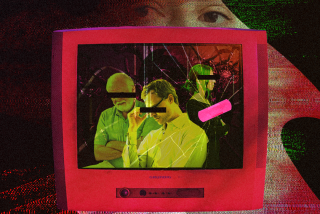Op-Ed: Hey, HBO, ‘Gone With the Wind’ romanticizes the horrors of slavery. Take it off your platform for now
- Share via
UPDATE: HBO Max announced it would remove “Gone With the Wind” from its lineup on Tuesday night, after this article had been published online.
Congratulations to WarnerMedia on the launch of HBO Max. As an HBO subscriber, I am excited about the breadth of programming and films offered on the platform. While I’m sure the streaming service will continue to improve with time, I have one request to WarnerMedia for the near term: Please consider removing “Gone With the Wind” from your rotation of films.
As a filmmaker I get that movies are often snapshots of moments in history. They reflect not only the attitudes and opinions of those involved in their creation, but also those of the prevailing culture. As such, even the most well-intentioned films can fall short in how they represent marginalized communities.
“Gone With the Wind,” however, is its own unique problem. It doesn’t just “fall short” with regard to representation. It is a film that glorifies the antebellum south. It is a film that, when it is not ignoring the horrors of slavery, pauses only to perpetuate some of the most painful stereotypes of people of color.
It is a film that, as part of the narrative of the “Lost Cause,” romanticizes the Confederacy in a way that continues to give legitimacy to the notion that the secessionist movement was something more, or better, or more noble than what it was — a bloody insurrection to maintain the “right” to own, sell and buy human beings.
The movie had the very best talents in Hollywood at that time working together to sentimentalize a history that never was. And it continues to give cover to those who falsely claim that clinging to the iconography of the plantation era is a matter of “heritage, not hate.”
Let me be real clear: I don’t believe in censorship. I don’t think “Gone With the Wind” should be relegated to a vault in Burbank. I would just ask, after a respectful amount of time has passed, that the film be re-introduced to the HBO Max platform along with other films that give a more broad-based and complete picture of what slavery and the Confederacy truly were. Or, perhaps it could be paired with conversations about narratives and why it’s important to have many voices sharing stories from different perspectives rather than merely those reinforcing the views of the prevailing culture.
Currently, there is not even a warning or disclaimer preceding the film.
I know taking down a film — particularly a classic Hollywood film — seems like a big request. But it’s not nearly as big a demand as when your children ask whether they can join protests in the streets against racial intolerance, or when they come to you wanting to know what you did to make the world a better place.
At a moment when we are all considering what more we can do to fight bigotry and intolerance, I would ask that all content providers look at their libraries and make a good-faith effort to separate programming that might be lacking in its representation from that which is blatant in its demonization.
I plan on keeping my subscription to HBO Max. But I hope that those in decision-making positions at WarnerMedia can understand how painful it is to scroll through the platform’s library and see it elevate one film in particular that has helped to perpetuate the racism that’s causing angry and grieving Americans to take to the streets.
John Ridley is a director, screenwriter and novelist. He won an Academy Award for adapted screenplay for “12 Years a Slave.”
The outpouring of anger in every corner of this country could finally put reparative justice within reach.
More to Read
A cure for the common opinion
Get thought-provoking perspectives with our weekly newsletter.
You may occasionally receive promotional content from the Los Angeles Times.










